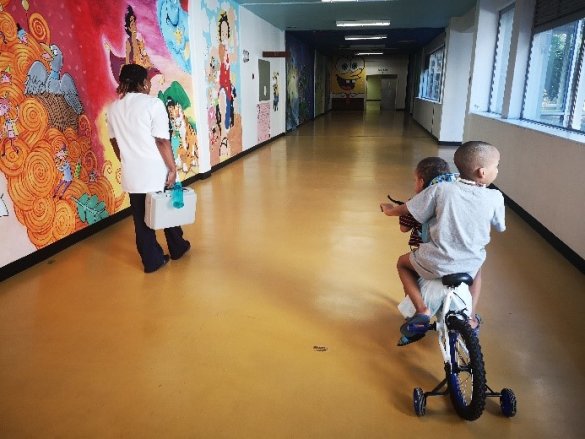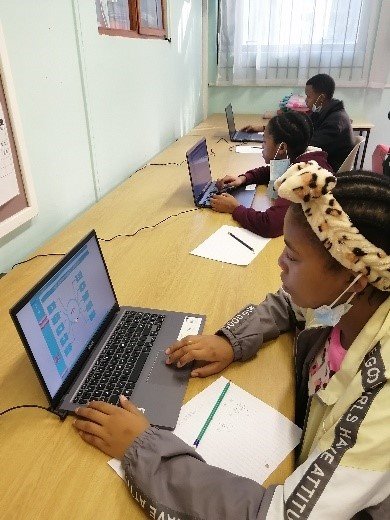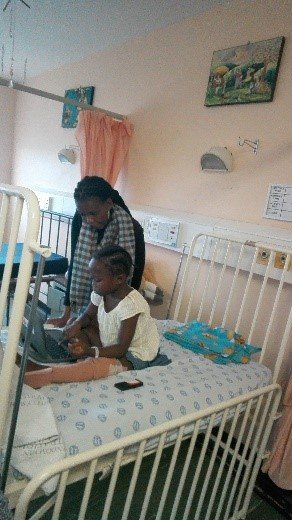Tygerberg Hospital School accommodates the unique needs of learners
28 July 2022
Tygerberg Hospital School fills an academic void in the lives of children who are in hospital for extended periods.
The school, which has been in existence since 1959, consists of a primary school section and a high school section. It is located on the lower ground floor at Tygerberg Hospital.
The school caters for approximately 45-50 learners daily, ranging from Grade R to Grade 12. These children suffer from illnesses such as cancer, heart, lung, kidney, liver and orthopaedic conditions.
Educators collect the children from the wards in the morning and accompany them (some in wheelchairs) to the school. They then return them to the wards after school. Children who are unable to leave their wards receive bedside education.
Some children attend Tygerberg Hospital School for a few days to several months or even years.
All classes are multigrade and multilingual. Modules are compiled for every grade according to the Curriculum and Assessment Policy Statement (CAPS) and each learner receives tuition at the appropriate level and pace.
The school also caters for learners who are well enough to go home but not to attend mainstream schools. Some children have been out of school for very long periods of time and are too old to join their grades. These children follow an Adult Basic Education and Training (ABET) stream at the school.
Tygerberg Hospital School provides another important service for a particularly vulnerable and previous neglected group of children – a specialised unit for psychiatric patients called iThuba, which is the Xhosa word for “opportunity”. iThuba was established in 2004 to accommodate a maximum of 15 learners (up to Grade 12) with psychiatric illnesses.
Previously, many of these learners lost irretrievable ground in respect of their educational development while spending prolonged periods in hospital, many relapsed when they returned to their school of origin, and many simply never returned to school and became vulnerable to negative environmental influences, including substance abuse and exploitation.
Now, after admission to the hospital, learners begin attending iThuba as soon as they can. After their discharge, while recovering and still too vulnerable to attend mainstream school, they continue attending iThuba if able to do so daily. This is a unique unit and the only one in the Western Cape.
The main goal is to assist the learners to be integrated back into a mainstream school, college, labour market and the community. The support the unit offers to these learners plays a big role in their recovery programme. An Occupational Therapist (sponsored by the Tygerberg Children’s Trust) comes in twice a week to give extra support to iThuba learners. The learners who attend this part of the school have diagnoses such as schizophrenia, bipolar disorder, anxiety disorders, obsessive-compulsive disorders (OCD), eating disorders etc.
Ithuba was initially conceptualised as a bridging facility for learners who, once fully recovered, could then return to mainstream education. However, over the years it became clear that recovery was not complete enough for all learners to return to mainstream schooling, and some have completed their education at iThuba. The unit is the only one of its kind in South Africa at present, serving patients from throughout the Western Cape, and represents a model that needs to be replicated in all centres where there are psychiatric inpatients services for children and adolescents.
The ultimate objective is to enable the learners to resume their school careers with ease following discharge from hospital.
Furthermore, the Tygerberg Hospital School caters for an additional 20 learners with Specific Barriers to Learning (Apraxia). The paediatric and neurological doctors of Tygerberg Hospital refer the pre-school learners. Apraxia of speech is a specific speech disorder. Children with this disorder have great difficulty planning and producing the precise, highly refined and specific series of movement of the tongue, lips, jaw and palate that are necessary for intelligible speech. The root is “praxis” which means movement.
The Grade R classes focus on language. The school offers speech therapy during class time to these learners. The class teacher and therapist work closely together.
The school has one “Hospital” Grade R class with 10 learners with a developmental delay. These are learners who have not gained the developmental skills expected of him or her, compared to others of the same age. The paediatric and neurological doctors at Tygerberg Hospital refer them to Tygerberg Hospital School.
Volunteers enhance the overall learning experience by presenting a variety of additional activities such as kinetics, karate, art and reading sessions aimed at cultivating a love for reading. The objective is to enable learners to resume their school career with ease following discharge from hospital.



